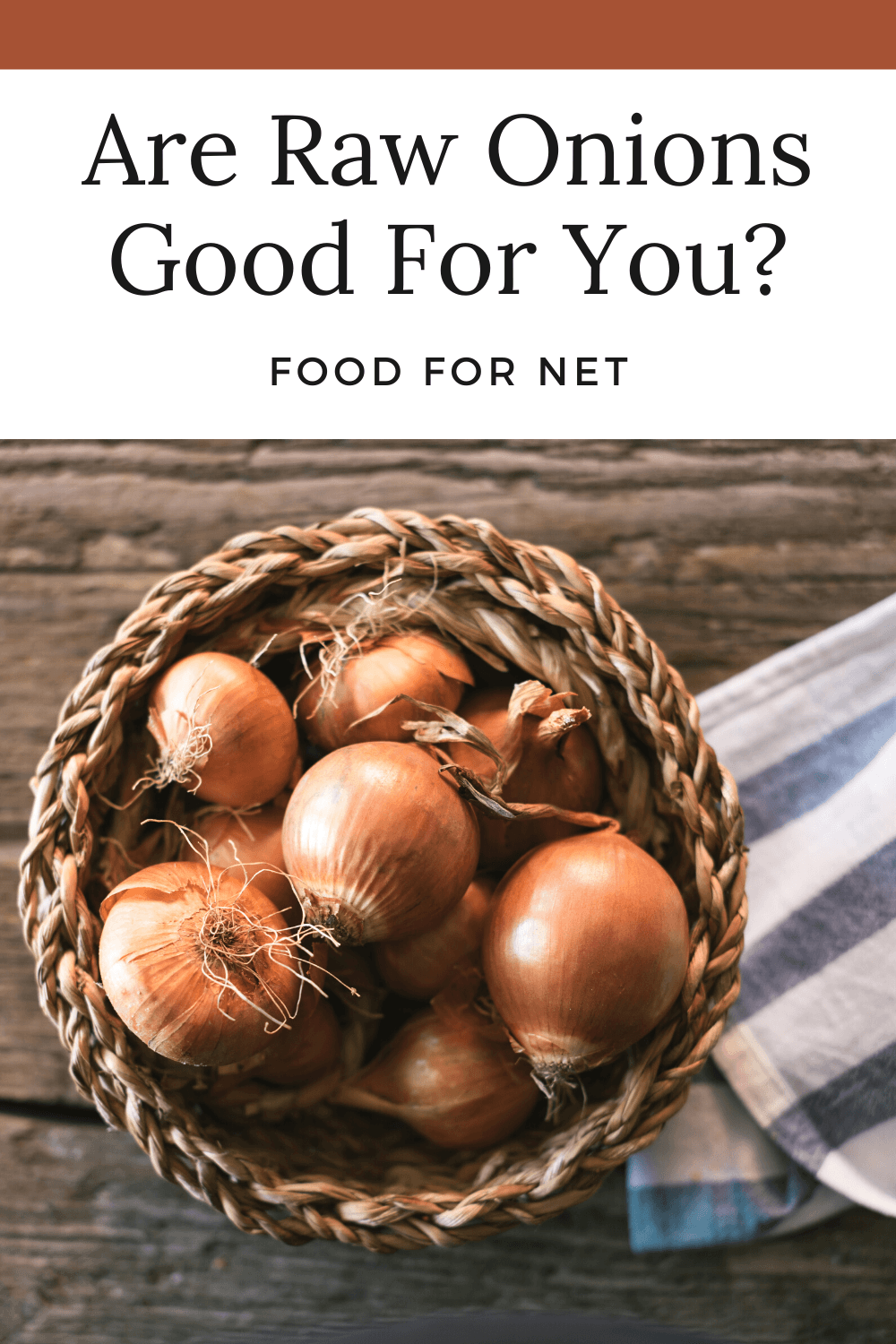
Onions are one of the most common dinner ingredients. We use them all the time to bulk out meals and provide a little extra flavor. Red onions go even further by adding a burst of color and an even stronger flavor to your meals. But are raw onions good for you?
Onions are also interesting because sometimes we cook them, but other times we eat them raw instead. What’s the best approach, then? Are raw onions good for you or should they always be cooked instead?
Part of the answer lies in onion nutrition, including any nutrient differences between raw onions and cooked ones. We also need to think about other compounds found in onions, including antioxidants and sulfur-based compounds. These are important for your health as well.
Are Raw Onions Good For You?
- Are Raw Onions Safe?
- Raw Onion Nutrition
- Benefits Of Raw Onions
- How Raw Onions Could Be Harmful
- Can Raw Onions Absorb Germs?
- Are Raw Onions That Much Better Than Cooked Ones?
- Creative Ways To Use Raw Onions
- Final Thoughts
Are Raw Onions Safe?
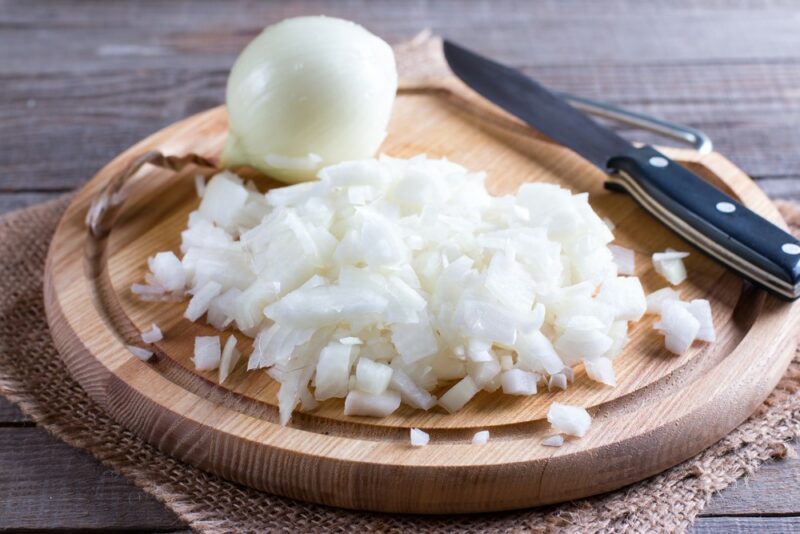
Let’s answer the most pressing question first. Yes, raw onions are safe to eat. They’re also popular, as they provide a sharp flavor kick that works well in dishes like salsa and guacamole.
Raw red onion is particularly appealing, as it has a distinct pungent flavor that complements salads and sandwiches surprisingly well.
You might have heard a myth that says otherwise. Some people claim that onions act almost like a magnet for bacteria. If this was the case, then raw onions would quickly become dangerous. Chopped raw onions would be even worse, as they have a greater surface area than a whole raw onion and are likely to absorb even more bacteria.
Except, you guessed it, the whole idea makes no sense. Onions don’t absorb bacteria like that. How on earth could they? In fact, the sulfurous compounds in onions make them resistant to bacterial contamination instead. Onions are also acidic, which further reduces the risk of bacterial growth.
Raw Onion Nutrition
To kick things off, let’s talk a little about the nutritional profile of raw onions. The first thing of note is that they’re incredibly low in calories. In fact, a 100 gram serving of raw white onion (that’s roughly 3.5 ounces), contains just 40 calories.
That same serving size also contains roughly:
- Protein: 1.1 grams
- Carbs: 9.3 grams
- Fiber: 1.7 grams
- Sugar: 4.2 grams
- Fat: 0.2 grams
There are some vitamins and minerals too, including vitamin C, vitamin B6, folate, and potassium. The levels of these are relatively low (not surprising, given that onions are mostly water). Still, every little bit helps and these nutrients all promote your health in a variety of ways.
Benefits Of Raw Onions
Their Sulfur Compounds
Onions contain some interesting sulfur-based compounds. This sounds like a bad thing, but the sulfurous compounds may lead to a surprising number of benefits.
Early research suggests that these compounds could help to decrease cancer risk. They’ve also been linked to reductions in cholesterol levels and may break down blood clots, effects that help to protect your heart.
There may be other effects too, like helping with insulin production and blood sugar control. Such effects are particularly relevant for anyone with diabetes. Eating onions regularly might even decrease the risk of some diabetes complications.
Some of these compounds are destroyed when you cook onions, making raw onions are much more powerful source of them.
Packed With Antioxidants

Onions also contain some potent antioxidants. Quercetin is one of these. Not only does this compound reduce oxidation, but it also has strong anti-inflammatory effects.
By decreasing oxidation and inflammation, quercetin and other antioxidants can help to protect your health and even lower disease risk. Because antioxidants can be damaged by cooking, raw onions should have higher antioxidant levels than cooked ones.
However, the type of onion that you choose also makes a difference. Red and yellow onions are much better sources of antioxidants than white ones.
Could Lower Cancer Risk
Some studies suggest that eating onions regularly could lower your risk of cancer, including colon and breast cancer. The effect may be related to the sulfur-based compounds in onions. If that is the case, raw onions may have more powerful anti-cancer effects than cooked ones.
As always, there are some gaps in our knowledge here. Cancer research is always tricky, as there are so many variables to consider. Most of our current evidence simply shows that higher levels of onion consumption are associated with decreased cancer risk. Whether onions themselves are causing that pattern remains to be seen.
What does this mean in practice? Simply that onions, particularly raw onions, might lower your cancer risk. The effect is far from proven, but onions are safe for most people, so why not eat more of them regardless?
They Give You Fiber
Whether they’re raw or cooked, onions provide you with 1.7 grams of fiber per 3.5 ounce serving. While this isn’t an exceptional amount of fiber, it’s still valuable, partly because most of us need more fiber.
With all the processed food out there these days, many of us aren’t getting enough fiber from our diets. We might think we are, but it’s incredibly easy to miss the mark with fiber.
Onions are surprisingly powerful here – not because they’re an amazing source of fiber, but because they’re so easy to add into your meals. This is even true if you’re using raw onions rather than cooked ones, as you can use thin slices of red onion in sandwiches or salads or chop onion up and use it in salsa.
How Raw Onions Could Be Harmful
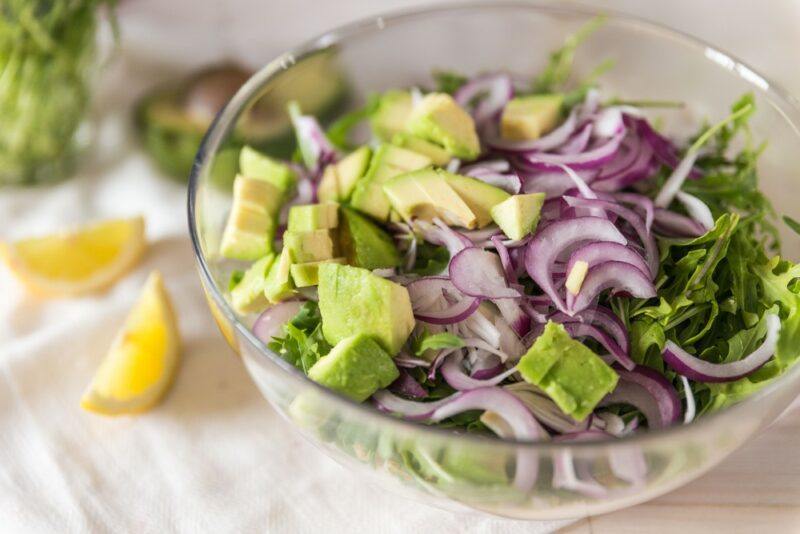
The FODMAPs
The term FODMAP refers to fermentable oligosaccharides, disaccharides, monosaccharides, and polyols. These are all short-chain carbs that our bodies don’t absorb well. The lack of absorption means that they can ferment instead, leading to uncomfortable side effects like bloating and stomach cramps.
FODMAPs don’t affect everyone equally. Some people have no problems with them at all. Others, particularly anyone with irritable bowel syndrome (IBS), need to be cautious with FODMAPs. This could even mean sticking to a low FODMAP diet.
Onions are a problem here, as they’re relatively high in fructans, which is a key type of FODMAP. In fact, onions and garlic are two of the worst ingredients for people with IBS and cause symptoms for many people.
Some IBS suffers find that they can tolerate cooked onions in small amounts, but raw onion is a no-go.
However, this is an area that you’ll need to experiment with, as IBS reactions can vary dramatically. You may find that you can eat some high FODMAP foods without issue, some in small portions, and others not at all.
Can Give You Side Effects
Side effects like heartburn, gas, and stomach cramps aren’t limited to people with IBS. Other people can have similar side effects.
Such effects are likely to be stronger for raw onions than cooked ones, as raw food is more challenging to digest. So, if you do experience any problems, you may want to cook your onions rather than eating them raw.
Can Increase Body Odor
While the sulfur compounds in onions do offer benefits, their effects aren’t always positive. One problem is that they can interact with the sweat on your skin, making you smell quite unpleasant.
This effect is likely to be worse with raw onions compared to cooked ones, as raw onions have higher levels of sulfur-based compounds than cooked ones do. Be particularly careful if you’re having large amounts of raw onion regularly. In that situation, this side effect could quickly become noticeable to other people.
They’re Frustrating To Work With
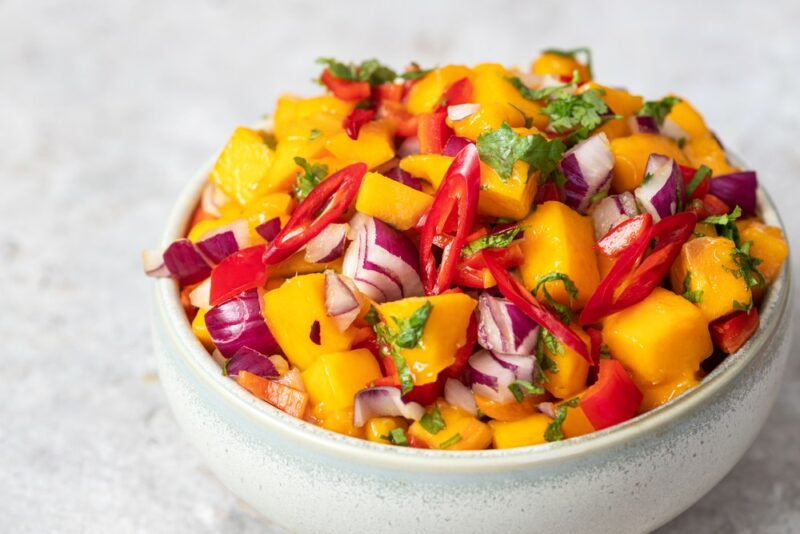
Here’s a familiar issue: cutting raw onions tends to make your eyes sting, and rubbing your eyes just worsens the whole sensation. When you eat raw onions, the same compounds can make your mouth feel like it’s burning.
Not a fun combination of features.
There are a few ways to chop onions with fewer issues. One is to chill your onions first (or even freeze them!). Doing so does decrease the effect of the chemical in onions.
Using a sharp knife rather than a dull one helps too, as you’re not tearing at the onion nearly as much. And, oddly enough, holding a piece of bread in your mouth seems to help too. The trick is to keep your mouth open, so the chemicals from the onion end up in the bread, rather than hitting your eyes.
You Need To Be Careful With Animals
On a side note, many pets have problems with onions. There’s even a risk that they might get poisoned from onions.
The sulfur-containing compounds are the main culprits here, making raw onions riskier than cooked ones. If you have pets in the house, you’ll need to be careful to make sure they don’t get anywhere near chopped onions or any foods containing onions.
Can Raw Onions Absorb Germs?
There’s an odd myth that surrounds raw onions, suggesting that they’re able to absorb bacteria from the air around them – essentially sucking bacteria in and helping to clear the air, keeping everyone around healthier. While the idea sounds absurd, it gets shared and reshared a shocking number of times.
There are related ideas out there too, including claims that eating raw onions with salt cures COVID-19.
Not surprisingly, such ideas are nonsense. There are no known mechanisms for onions absorbing microbes or toxins. The idea probably goes all the way back to the 19th century, when onions were used for folk medicine.
Are Raw Onions That Much Better Than Cooked Ones?
Raw onions are generally safe and offer plenty of benefits. So, how do they compare to cooked ones?
The biggest difference is in the sulfur-based compounds. The concentration of these is much higher in raw onions than in cooked ones. This effect could make raw onions much healthier, making them better at decreasing cancer risk and controlling your blood sugar levels.
However, the sulfur-based compounds are a double-edged sword, as they’re also responsible for some of the side effects from raw onion, including body odor. Raw onions are also more difficult to digest than cooked ones and may lead to more side effects. As such, they’re not a great choice for everyone.
In the end, whether raw or cooked onions are best depends on the individual. If you tolerate raw onions well and enjoy the taste, then they could be a great addition to your diet. If you get side effects instead, it may be better to skip them.
It’s always important to use your body as a guide like this, as we’ll all different and don’t respond to foods in the same way. Sometimes an ingredient that is great for your health is harmful for someone else and vice versa.
Creative Ways To Use Raw Onions
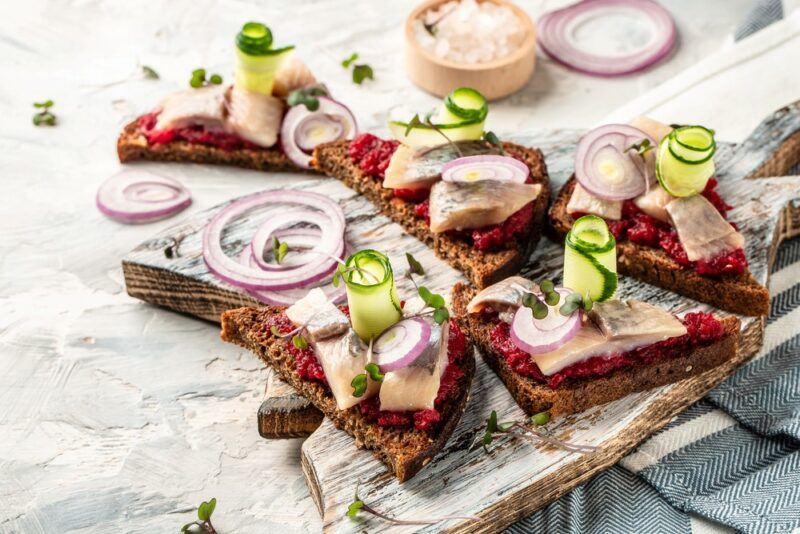
Raw onions are normally used in uncooked dishes, like salads, sandwiches, and some condiments. For example, you might slice red onion thinly and use it in your sandwiches. Or, perhaps chop up white onion and include it in guacamole or salsa.
You don’t need to stop with these classics either. You can add raw onions to countless other dishes, including tacos and relishes.
You could also try stirring chopped raw onions through a cooked dish, like a stir fry. The onions would get heated a little from the other ingredients, but they should retain most of their beneficial properties.
Raw onions have a strong flavor that can sometimes be a bit too much. If you find the taste to be overwhelming, try soaking the onion in cold water first. This decreases their intensity, making the onions much easier to enjoy.
You could also experiment with marinated onions, like the ones in this recipe. Marinating onions changes their flavor profile and makes them useful in a broader set of situations.
Final Thoughts
Onions are a good source of fiber and are a useful ingredient, one that can be used in countless ways.
The sulfur-based compounds offer extra benefits, potentially decreasing the risk of cancer and helping with blood sugar levels. These compounds are why raw onions might be healthier than cooked ones.
Might is the operative word, though, as raw onions tend to trigger more side effects than cooked ones and many people just can’t tolerate them. You’ll need to experiment to see whether raw onions fit well in your diet. Don’t stress if they’re not a good match. Despite some over-the-top claims, raw onions won’t dramatically improve your health. They’re not poisonous either. They’re simply an ingredient that you might want to add to your diet.
Frequently Asked Questions
Can Raw Onions Make You Sick?
Some people claim that cut raw onions literally absorb bacteria. This suggests that cut onions that have been sitting around are teeming with bacteria and are likely to make you ill. It’s an absurd idea.
Whether they’ve been sitting around or not, raw onions aren’t likely to make you sick. Like many other vegetables, they can be eaten raw without any problems.
Are Onions Healthiest Raw Or Cooked?
Raw onions may be healthier, as they contain higher levels of sulfur-based compounds and these are linked to the most health benefits. However, cooked onions tend to produce fewer side effects and still provide plenty of healthy compounds, so they’re still a good choice.
Can Raw Onions Cause Stomach Pain?
Yes. The FODMAPs in onions can lead to side effects, including stomach pain and bloating. This is particularly likely if you have irritable bowel syndrome or a sensitive gut.
Cooking your onions first reduces the risk of symptoms, but even this mightn’t be enough if you’re very sensitive.
Are Raw Onions Safe During Pregnancy?
Raw onions are completely safe, even if they’ve been cut and left for a while. However, you still need to follow standard food safety approaches, like making sure there’s no contamination from raw meat (such as if you use the same knife).
Are Raw Onions Spicy?
Raw onions have a strong pungent taste that’s often described as spicy. This comes from an enzyme called isoalliin within the cells that converts to pungent compounds after the onion has been cut.
Thankfully, the spiciness isn’t intense and is quickly lost when you even lightly cook the onions.



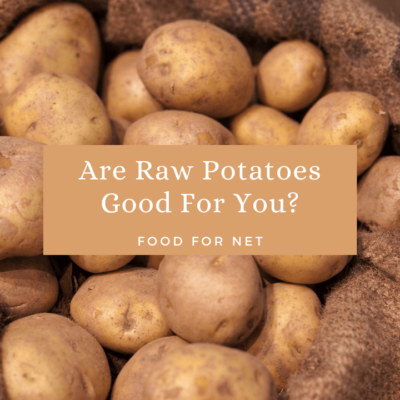




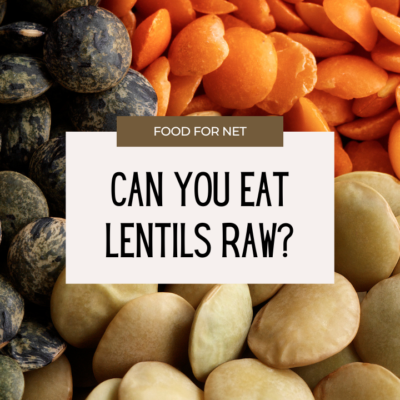
 5 Best Pea Protein Powder Brands
5 Best Pea Protein Powder Brands
Leave a Reply